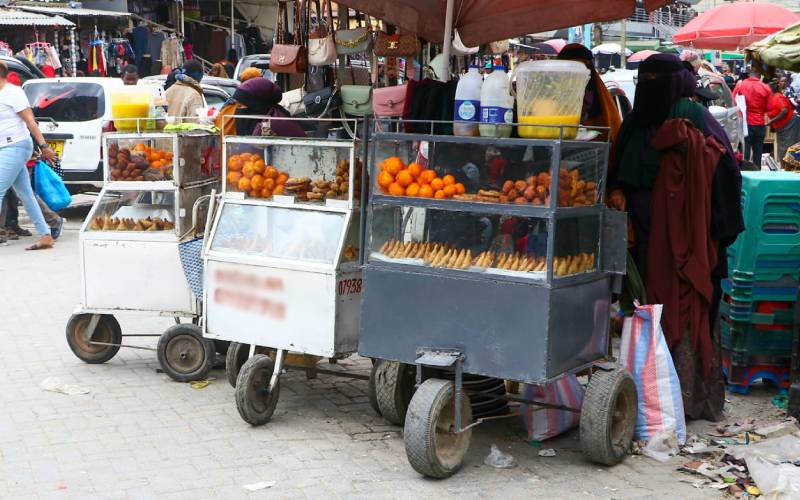Nairobi introduces manual to enhance food safety practices among street vendors

The manual offers clear and practical guidance for vendors on how to handle raw and cooked food safely.
For many Nairobi residents, street food is more than just a meal; it’s a quick, affordable, and often comforting part of their daily lives.
However, concerns about food safety and hygiene have long been a challenge for vendors and consumers alike.
More To Read
- Kenya raises alarm on surge in synthetic drugs, shifting trafficking trends
- Vaccines and motherhood: Are AI-generated health messages working in Kenya and Nigeria?
- Turkana moves to safeguard health with bold One Health Bill
- Ministry of Health sounds alarm over rising youth addiction linked to tobacco, calls for tougher laws
- Turkana County launches digital WASH Map to revolutionise water management
- Turkana marks major sanitation milestone as seven villages declared open defecation free
In response to these issues, Nairobi County is launching a new food safety manual to help street food vendors improve hygiene practices and reduce health risks for both sellers and customers.
As reported by The Star, developed by the University of Nairobi and the African Population and Health Research Centre, the manual offers clear and practical guidance for vendors on how to handle raw and cooked food safely.
The initiative is aimed at educating public health officers, who will work directly with vendors to ensure safer food practices are adopted across the city.
Street food has become an integral part of the city’s culture, providing a crucial source of affordable nutrition for low-income families.
Yet, as these vendors often operate without formal training in food handling, the risks associated with contamination and foodborne illnesses remain a significant concern.
This manual aims to bridge that gap by providing vendors with the knowledge they need to keep food safe and healthy.
Food safety specialists have stressed the importance of maintaining hygiene in food preparation and service.
"Food safety is often overlooked in food security conversations, yet it is crucial to human health, dignity, and overall well-being," they stated.
Contamination
Street food vendors, who often work in busy and crowded environments, are frequently exposed to conditions that make contamination more likely—poor sanitation, lack of proper storage, and congestion are among the most common issues.
“The biggest issue is hygiene,” the manual reads, pointing to the challenges of maintaining cleanliness in busy public spaces. Vendors are often faced with the difficulty of operating in tight spaces with limited resources, which can make safe food handling practices harder to follow.
The manual, titled Food Safety Training Manual for Street Food Vendors, goes beyond basic hygiene.
It covers the causes and symptoms of foodborne illnesses, common food contaminants, and best practices for food handling, preparation, and storage.
By using local and international legal frameworks, such as Kenya’s Public Health Act (Cap. 242) and the Food, Drugs, and Chemical Substances Act (Cap. 254), the manual aims to create a safer environment for both vendors and their customers.
The impact of unsafe food is far-reaching. The World Health Organisation reports that each year, 600 million people globally fall ill due to foodborne diseases, leading to 420,000 deaths.
Nairobi’s street food vendors, therefore, play a pivotal role in improving public health, with the manual serving as a tool to guide them towards safer practices.
For many vendors, this initiative could be life-changing. As street food serves as the primary livelihood for thousands of individuals in Nairobi, better food safety measures will not only protect customers but also help vendors build trust and expand their businesses.
Top Stories Today
















































